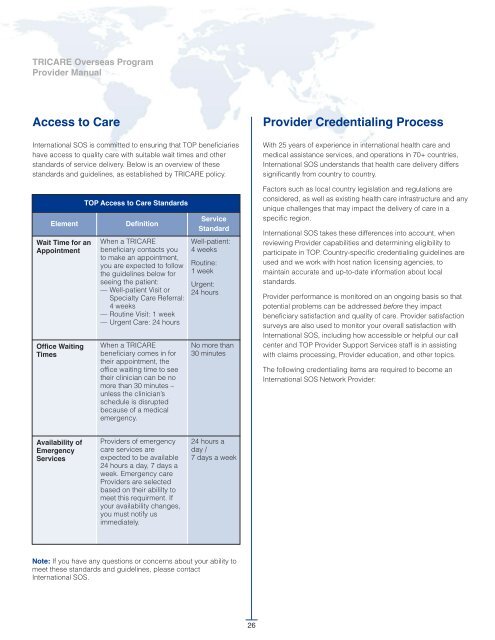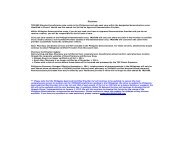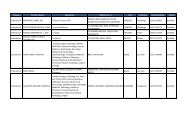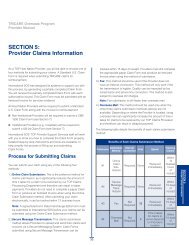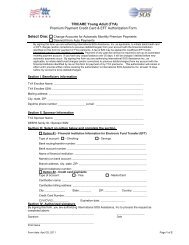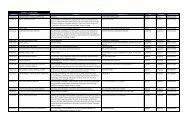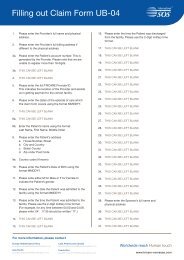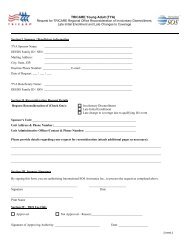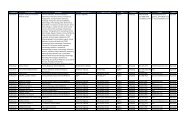TRICARE Overseas Program Provider Manual
TRICARE Overseas Program Provider Manual
TRICARE Overseas Program Provider Manual
You also want an ePaper? Increase the reach of your titles
YUMPU automatically turns print PDFs into web optimized ePapers that Google loves.
<strong>TRICARE</strong> overseas <strong>Program</strong><br />
<strong>Provider</strong> <strong>Manual</strong><br />
Access to Care<br />
International SOS is committed to ensuring that TOP beneficiaries<br />
have access to quality care with suitable wait times and other<br />
standards of service delivery. Below is an overview of these<br />
standards and guidelines, as established by <strong>TRICARE</strong> policy.<br />
Element<br />
Wait Time for an<br />
Appointment<br />
office Waiting<br />
Times<br />
ToP Access to Care Standards<br />
Definition<br />
When a <strong>TRICARE</strong><br />
beneficiary contacts you<br />
to make an appointment,<br />
you are expected to follow<br />
the guidelines below for<br />
seeing the patient:<br />
— Well-patient Visit or<br />
Specialty Care Referral:<br />
4 weeks<br />
— Routine Visit: 1 week<br />
— Urgent Care: 24 hours<br />
When a <strong>TRICARE</strong><br />
beneficiary comes in for<br />
their appointment, the<br />
office waiting time to see<br />
their clinician can be no<br />
more than 30 minutes –<br />
unless the clinician’s<br />
schedule is disrupted<br />
because of a medical<br />
emergency.<br />
Service<br />
Standard<br />
Well-patient:<br />
4 weeks<br />
Routine:<br />
1 week<br />
Urgent:<br />
24 hours<br />
No more than<br />
30 minutes<br />
<strong>Provider</strong> Credentialing Process<br />
With 25 years of experience in international health care and<br />
medical assistance services, and operations in 70+ countries,<br />
International SOS understands that health care delivery differs<br />
significantly from country to country.<br />
Factors such as local country legislation and regulations are<br />
considered, as well as existing health care infrastructure and any<br />
unique challenges that may impact the delivery of care in a<br />
specific region.<br />
International SOS takes these differences into account, when<br />
reviewing <strong>Provider</strong> capabilities and determining eligibility to<br />
participate in TOP. Country-specific credentialing guidelines are<br />
used and we work with host nation licensing agencies, to<br />
maintain accurate and up-to-date information about local<br />
standards.<br />
<strong>Provider</strong> performance is monitored on an ongoing basis so that<br />
potential problems can be addressed before they impact<br />
beneficiary satisfaction and quality of care. <strong>Provider</strong> satisfaction<br />
surveys are also used to monitor your overall satisfaction with<br />
International SOS, including how accessible or helpful our call<br />
center and TOP <strong>Provider</strong> Support Services staff is in assisting<br />
with claims processing, <strong>Provider</strong> education, and other topics.<br />
The following credentialing items are required to become an<br />
International SOS Network <strong>Provider</strong>:<br />
Availability of<br />
Emergency<br />
Services<br />
<strong>Provider</strong>s of emergency<br />
care services are<br />
expected to be available<br />
24 hours a day, 7 days a<br />
week. Emergency care<br />
<strong>Provider</strong>s are selected<br />
based on their abililty to<br />
meet this requirment. If<br />
your availability changes,<br />
you must notify us<br />
immediately.<br />
24 hours a<br />
day /<br />
7 days a week<br />
Note: If you have any questions or concerns about your ability to<br />
meet these standards and guidelines, please contact<br />
International SOS.<br />
26


